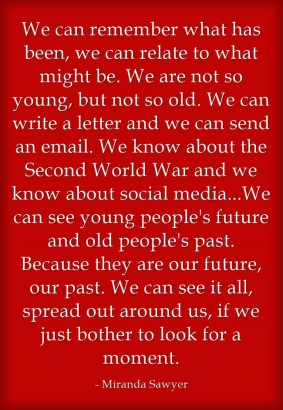I recently taught a session for the University of Toronto’s MHScMRS program on “Professional Legacy” as part of their leadership course. The (frankly a bit pompous!) title and invitation came from a dinner conversation with my old friend Cate in Toronto a few months ago. We’ve both had our 50th birthdays this year. The midlife crisis is a well-worn trope, it’s become a running joke in my house (where my wife is close behind me in age) that anything and everything can be attributed to hormonal fluctuations (just try Googling “menopause”). For a few weeks after “the big 5-0” nothing seemed to be different, just a number, right? But after a couple of months I started to fret, to worry about my health, my work – my internal compass seemed to be spinning. I started to do the “death maths” – statistically speaking; we’re past our midpoint and on the downward slope – I joined a gym, introduced myself to chia and almond milk. I talked a lot to women around my age – did they feel like they were going slightly crazy? Not just the physical symptoms, did they feel like they were becoming somewhat unhinged? And, resoundingly, they did. Forgetfulness, feeling overwhelmed, health scares – and lots and lots of wondering “My God, how did I get here?” Despite the metaphor of being “over the hill” it seems that, in reality, happiness is U-shaped. Middle age is our saddest time, with the late 40s being the lowest ebb psychologically speaking After that it is actually uphill! So perhaps less of a comedy midlife crisis, and more like a normal life condition.
Gail Sheehy famously pointed out in “The Silent Passage” that women after menopause often enter a new phase of creativity. The hormonal storms that have rocked our mental boats for the past 30 or 40 years die down, and in the calm that follows we can pause and examine what we have accomplished, and what there might be left to do. Cate and I talked about this over dinner, and how we suddenly feel that (career wise) time is running out. What we do, what we leave behind, should be meaningful if at all possible. To paraphrase William Morris, we want to devote our energy to nothing that we don’t know to be useful or believe to be beautiful. In reading for my EdD narrative inquiry course, I also came across Erik Erikson and his theory of the stages of psychosocial development. From your 20s to around 40, according to Erikson, your life work is “love” (how great is that?). We labour to develop intimacy and connections, and to build the foundation for a life well lived with people that we care about. During middle adulthood (from 40 to about 65) we start to wonder what we will leave the world. This stage of “generativity” could be work, children, pastimes – but it is important as we move forward and if we feel that we haven’t done this well, we regret, we stagnate and, ultimately, wonder where it all went wrong. Sounds like a midlife crisis to me.
So, all things considered, I was due for a bit of introspection. Talking to Joanna, Winter and Tasha (the MHScMRS students) was a great opportunity to do that. My “work-life blend” is always busy, often difficult but usually joyful. I realised my job and my professional identity are not the same. When I bump up against the reductionist, managerial side of health care and get frustrated, I can refocus on research, education and the things that get me up in the morning. I realised that the undergraduate English degree that I turned down thirty years ago for “science” and job security, and my ongoing love of reading, and writing have been integral to where I am now in the EdD program at UBC. I realise, looking back, that the year I stopped being a radiation therapist because my father died and I just couldn’t do it anymore was the most important year of my professional life – when I started an undergraduate degree, and had the time and space to look around, to think about what I wanted to do with the rest it. I am not sure how much my own reflections about my “professional legacy” or journey were helpful to other people, but the opportunity to start thinking about it was invaluable.
Informed by:
Holstein, J. A. & Gubrum, J. F. (2012). Varieties of Narrative Analysis. Thousand Oaks, California. Sage
Sheehy, G. (1992). The Silent Passage: Menopause. New York, New York: Random House
Sawyer, M (2016). Out of Time. London, England: Harper Collins
